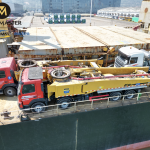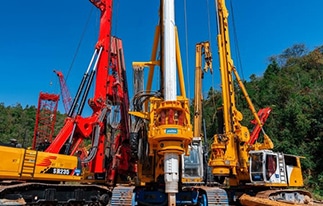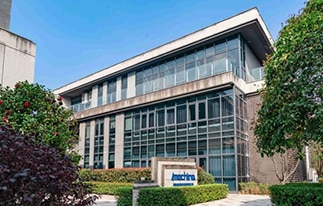Used Concrete Pump Truck for the Saudi Arabia sector presents a lucrative opportunity for businesses. One way to capitalize on this growth is by importing used concrete pump trucks. This comprehensive guide provides a detailed roadmap for navigating the complexities of importing these machines, ensuring compliance, and maximizing return on investment. We aim to offer a professional, reliable, and efficient guide to help you navigate the process.
Relative Reading:
Ugly Truth Behind China Used Construction Machinery Exports
Where to Buy Used Concrete Pumps with Mercedes or HOWO Chassis in Gulf Region
What Are The Most Common Concrete Pump Wear Part?
SANY Concrete Pump Hydraulic Failure: Causes and Solutions
Why Consider Importing Used Concrete Pump Trucks to Saudi Arabia?
Market Overview and Construction Boom in Saudi Arabia
Saudi Arabia is currently experiencing a massive construction boom, fueled by Vision 2030 projects. This surge in construction activity has created a high demand for concrete, and consequently, for concrete pump trucks. With numerous infrastructure projects underway such as NEOM, the need for reliable and cost-effective equipment is paramount.

Cost-Effectiveness of Used Equipment vs. New Equipment
Opting for used concrete pump trucks offers significant cost savings compared to purchasing new machines. The initial investment is lower, allowing companies to allocate resources to other critical aspects of their projects. Furthermore, well-maintained used equipment can provide similar performance to new machines at a fraction of the cost. Considering a used concrete pump truck is a valuable choice.
Chinese Brand SANY, ZOOMLION, XCMG: The Power of Integration
SANY, ZOOMLION, and XCMG are the largest Chinese manufacturers, leveraging competitive pricing and vast manufacturing scale. Their market positioning in Saudi Arabia offers a compelling value proposition for budget-conscious buyers, particularly given the readily available spare parts and established local presence.
| Brand | Strengths in KSA Market | Acquisition of European Technology | Implications for Used Buyers |
| SANY | Highly competitive pricing, extensive domestic (China) R&D investment. | Acquired German leader Putzmeister in 2012. | Used SANY models benefit from improved hydraulic and boom designs informed by Putzmeister technology. Look for models produced post-2012 for the biggest technical leap. |
| ZOOMLION | Strong focus on digitalization and long-boom technology. | Acquired Italian innovator CIFA in 2008. | Used ZOOMLION models leverage CIFA’s patented composite/carbon-fiber boom technology, which is critical for ultra-long reach pumps. This acquisition also enhanced their concrete handling and mixer technology. |
| XCMG | Massive production capacity and government support. | Acquired a majority stake in German firm Schwing in 2012. | Used XCMG models benefit from incorporating Schwing’s advanced core pumping unit technology (like the Rock Valve) which is vital for handling harsh aggregate mixes common on large infrastructure projects. |
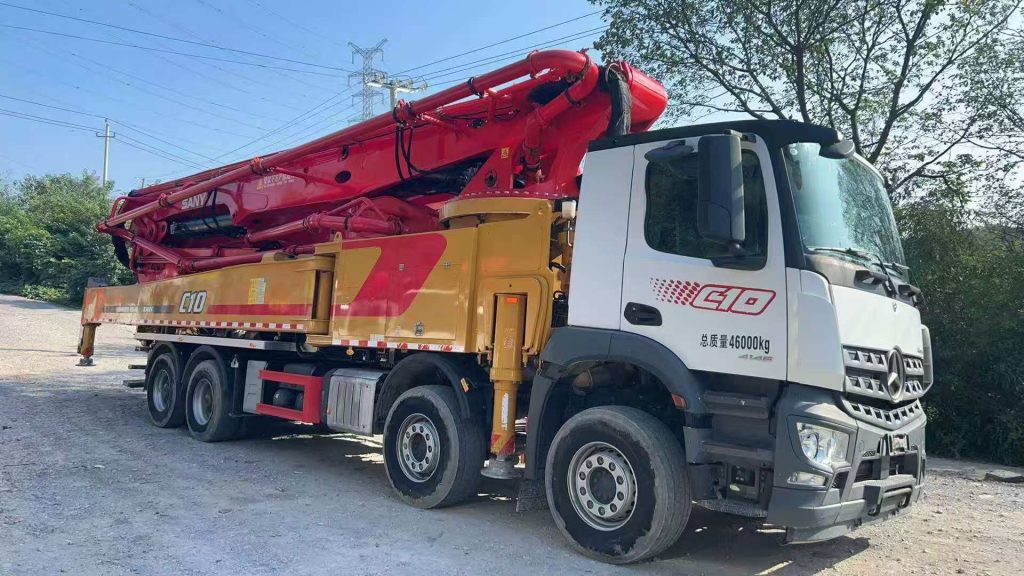
European Brand PUTZMEISTER, CIFA, SCHWING: Durability and Reliability
Putzmeister, CIFA, and Schwing are traditionally recognized for their advanced technology, superior durability, and proven reliability. While their initial cost is typically higher, their robust build quality and longevity often result in higher resale value in the KSA market.
| Brand | Strengths in KSA Market | Relationship Status | Implications for Used Buyers |
| PUTZMEISTER | Renowned “Made in Germany” quality, advanced control systems, and high residual value. | Acquired by SANY (2012). | Putzmeister continues to operate as SANY’s premium global brand, maintaining its separate distribution network. Older, pre-2012 used models are often sought after for their pure German engineering and high reliability. |
| CIFA | Known for innovation, excellent pumping efficiency, and lightweight design. | Acquired by ZOOMLION (2008). | CIFA technology (especially carbon fiber) has been heavily integrated into Zoomlion’s long-boom line. Used CIFA-branded units are often favored for compact sites and precise operations. |
| SCHWING | Industry-leading core components, especially the Rock Valve, prized for handling difficult concrete mixes and high-pressure pumping. | Acquired by XCMG (2012). | Schwing maintains its strong reputation for durability. Used models are preferred for projects demanding maximum uptime and reliability under challenging conditions. |
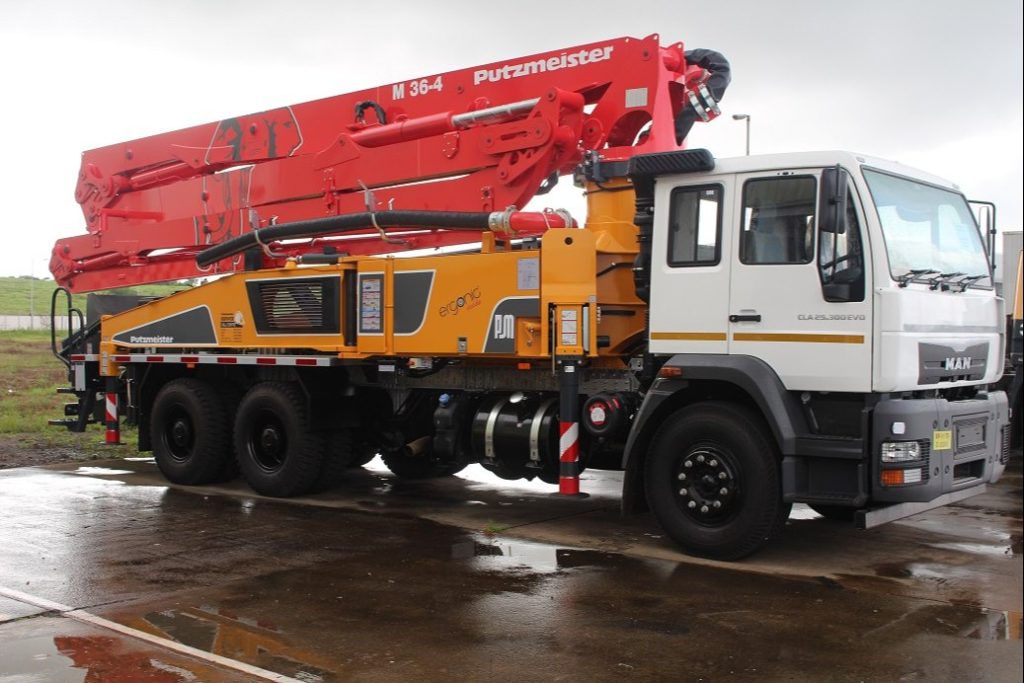
Regulations and Compliance for Used Concrete Pump Truck to Saudi Arabia
Navigating the regulatory landscape is crucial for successful importation. Several key organizations and regulations govern the process.
Age Restriction on Used Heavy Vehicles
Used concrete pump trucks are classified as heavy transport trucks (vehicles over 3.5 tons) and are subject to strict age limitations on importation.
- Maximum Operational Age: The operational age of imported heavy transport trucks, which includes vehicles like concrete pump trucks, must not exceed 5 years.
- Age Calculation: The age is calculated from the beginning of January of the year of manufacture. For example, if the current year is 2025, a truck manufactured in 2020 would be at its maximum age limit for import consideration (as 2025−2020=5 years).
- Condition and Compliance: The used truck must be in good operating condition, free from major damage, and must not have a history of use in prohibited roles (like police vehicles or heavily modified vehicles).
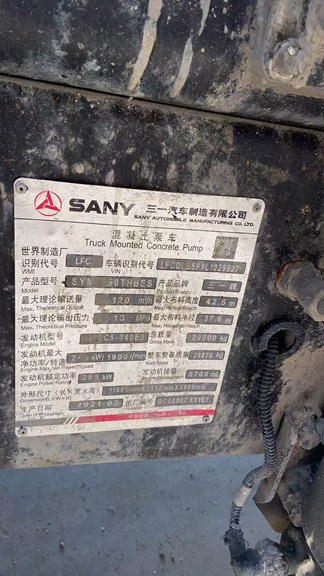
Customs Regulations and Import Duties
For the Used Concrete Pump Truck to Saudi Arabia, the Saudi customs authority, the Zakat, Tax, and Customs Authority (ZATCA), governs clearance and fee collection.
- Import Duty (Customs Tariff): The standard customs duty for most imported goods is 5% of the Cost, Insurance, and Freight (CIF) value of the shipment. This rate may vary based on the specific Harmonized System (HS) code classification for concrete pump trucks.
- Value Added Tax (VAT): A standard 15% VAT is applied to the total CIF value plus the customs duty.
- Pre-Arrival Clearance (Fasah): Importers are generally required to complete customs declaration and clearance procedures on the “Fasah” platform at least 48 hours prior to the arrival of the shipment at the port of entry to expedite the clearance process.
- Required Documents: Key documentation required by ZATCA typically includes the Commercial Invoice, Certificate of Origin, Packing List, and most critically, the Shipment Certificate of Conformity (SCoC) obtained via the SABER platform.
SABER System: A Pre-Shipment Inspection Requirements
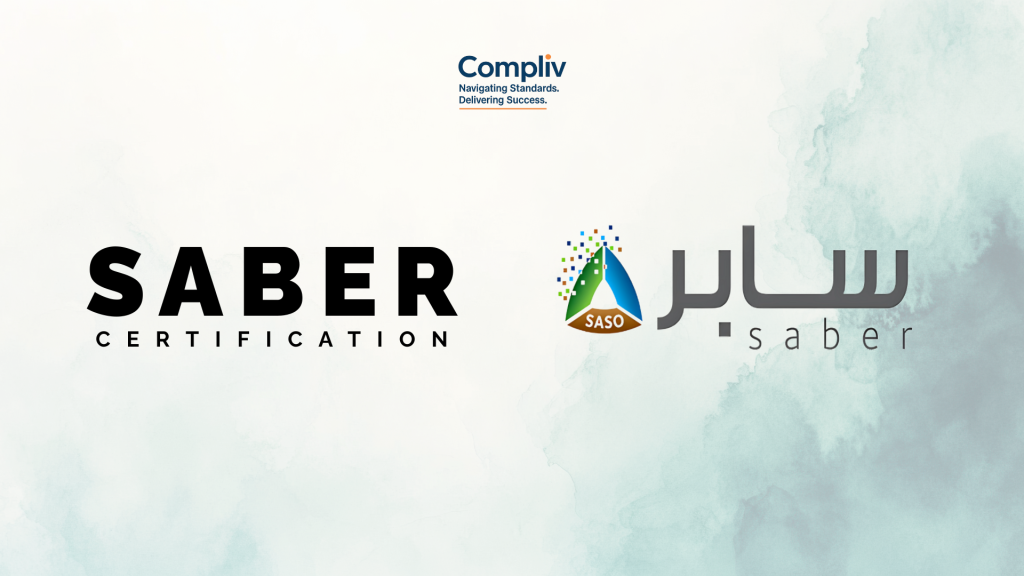
A mandatory Pre-Shipment Inspection (PSI) is a core component of obtaining the necessary conformity certificates through the SABER system, especially for used regulated products.
- Mandatory Inspection: The concrete pump truck must undergo an inspection by a SASO-accredited Inspection Body (IB) or Certification Body (CB) in the country of export before shipment.
- Inspection Scope: The PSI focuses on verifying the physical condition, functionality, and compliance of the used truck against the applicable SASO Technical Regulations and GSO/GCC standards. This includes:
- Verifying the vehicle’s manufacturing date and age. Confirming compliance with safety features. Checking the correct labeling and marking, including the country of origin. Verifying documentation to ensure it matches the physical item.
- Certificate of Inspection (CoI): For used vehicles and heavy machinery, a CoI is often issued by the accredited body via the SABER platform following a successful inspection, which serves as the proof of conformity required to issue the final SCoC.
Road Vehicle Emission Standards in Saudi Arabia
Saudi Arabia primarily regulates road vehicle emissions by adopting the Euro 5 standard for light-duty vehicles and heavy-duty vehicles.
These measures, enforced by local regulatory bodies like SASO (Saudi Standards, Metrology and Quality Organization), ensure that both imported and domestically manufactured new vehicles meet stringent limits for pollutants. Furthermore, the Kingdom has implemented a mandatory Saudi Corporate Average Fuel Economy (SAUDI CAFE) standard for light-duty vehicles (LDV).
This is a critical element of the nation’s Vision 2030 and sustainability goals, aiming to significantly boost the average fuel efficiency of the new vehicle fleet to 19 kilometers per liter by 2025 and reduce overall CO2 emissions. These standards reflect Saudi Arabia’s commitment to improving air quality, conserving energy resources, and reaching its net-zero GHG emissions target by 2060.
The Import Process for Used Concrete Pump Truck to Saudi Arabia
Step 1: Assessing Your Needs and Choosing the Right Concrete Pump Truck
The first step involves a thorough assessment of your project requirements. Consider the size of your construction sites, the required concrete pumping capacity, and the necessary boom reach, vertical and horizontal. Ensure the pump capacity (cubic meters per hour) also matches the speed and volume demands of your largest projects.
Step 2: Sourcing, Due Diligence, and Age Compliance
Finding a reputable supplier is crucial for quality, but the first filter must be Saudi Arabia’s strict age restriction.
- Mandatory Age Limit Check: For heavy transport trucks (over 3.5 tons), the operational age must not exceed 5 years from the year of manufacture (calculated from January 1st of the manufacturing year). Do not proceed with any truck that exceeds this limit, as it will be rejected at customs.
- Due Diligence: Conduct thorough due diligence to verify the supplier’s credentials, reputation, and experience. Integrity is the cornerstone of a reliable supplier.
- Quality Control Procedures Employed by Suppliers: Inquire about the quality control procedures employed by the suppliers. A reputable supplier will have rigorous inspection and testing processes to ensure the equipment meets your expectations.
- How to Find a Reliable Supplier (Focus on China): Sourcing from China can offer cost advantages. Consider working with established trading companies or visiting reputable online marketplaces such as Alibaba or Made-in-China. Always prioritize suppliers with positive reviews and verifiable credentials, and request proof of their export history to the GCC/Middle East.
Step 3: Professional Inspection, Certification Preparation, and Refitting
This critical step integrates the Pre-Shipment Inspection (PSI) needed for Saudi compliance.
- Importance of Professional Inspection Services (Pre-Purchase): Engaging a professional inspection service (ideally one that is a SASO-accredited body or works closely with one) is highly recommended to assess the condition of the used concrete pump truck before purchase. This inspection can identify potential issues and prevent costly surprises later on.
- Key Areas to Inspect: Engine, Hydraulics, Pumping System: The inspection should cover key areas such as the engine, hydraulics, and pumping system. Crucially, the inspection must also verify the chassis number (VIN), year of manufacture, and engine specifications to ensure it can comply with Saudi emission Euro V (GCC/GSO) and energy efficiency standards.
- Requesting Detailed Inspection Reports and Service History: Request detailed inspection reports and service history for the used concrete pump truck you are considering. These documents provide valuable insights into the equipment’s condition and maintenance record.
- Identifying Potential Refitting and Maintenance Needs: Identify any potential refitting and maintenance needs based on the inspection report. Factor these costs into your overall budget. Note: Any necessary refitting to meet GCC/SASO safety or technical standards must be completed before the final Pre-Shipment Inspection for SASO certification.
Step 4: Negotiating the Purchase and Payment Terms
- Securing Favorable Pricing and Payment Schedules: Negotiate the purchase price and payment terms with the supplier. Aim for a favorable pricing and payment schedule that aligns with your budget and cash flow.
- Understanding Incoterms (International Commercial Terms): Familiarize yourself with Incoterms (e.g., FOB, CIF) to understand the responsibilities of the buyer and seller regarding transportation, insurance, and customs clearance. DDP (Delivered Duty Paid) is rarely recommended for complex imports like heavy machinery into KSA, as it gives the seller too much control over critical customs steps.
- Ensuring Proper Documentation and Warranties: Ensure that all necessary documentation is in order, including the purchase agreement, inspection reports, and most importantly, the vehicle title/export certificate, which will be required by Saudi Customs (ZATCA).
Making an Informed Decision about Importing Used Concrete Pump Truck to Saudi Arabia
Importing used concrete pump trucks to Saudi Arabia can be a cost-effective way to meet the growing demand for concrete pumping equipment. By following the steps outlined in this guide, conducting thorough due diligence, and complying with all regulations, you can make an informed decision and maximize your chances of success. Remember to prioritize integrity, efficiency, and reliability throughout the process. Altruism in sharing best practices benefits the entire industry.

